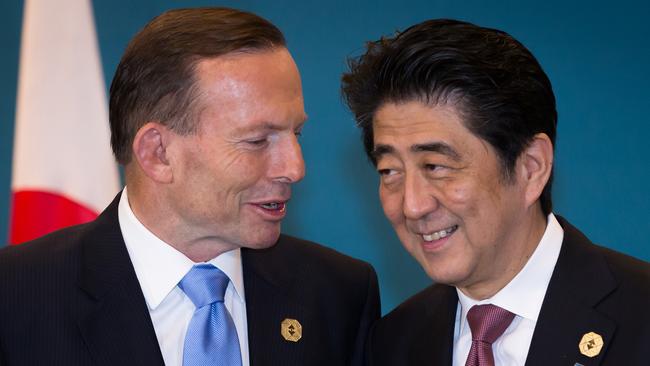
Every Australian heart should grieve with sadness at the murder of a leader of historical consequence, who was also the most pro-Australian leader Japan has ever had.
Abe was a good friend of Australia, and many Australians were personal friends of his. Many more were admirers.
Japan’s longest-serving prime minister, he had a strategic vision of the Japan/Australia partnership which was ambitious, transformative and profoundly in both our national interests.
Abe was the strongest political and intellectual influence in Japan’s strategic posture. He founded the Quadrilateral Security Dialogue and persisted with it when other leaders — notably Australia’s Kevin Rudd — turned against it.
In office, Abe was no warmonger, but he understood profoundly that Japan’s pacifist constitution was not fit for purpose in a region coping with the rise of an ultra-aggressive China. He believed in democracy and wanted the great Asian democracies — Japan, India, Australia and the US — to form the closest strategic association.
He was not successful in everything he tried. It was a long, slow, painstaking process to convince his countrymen to go along with this liberating but demanding vision.
Abe pioneered trade and military closeness with Australia. He was keen to further transform Japan’s strategic personality, while drawing much closer to Australia and the US by selling us submarines. He formed a close friendship with Tony Abbott and, had this agreement come to fruition, Australia would soon have had the first of a new generation of conventional submarine that would have been the perfect bridge to nuclear-powered ones.
Abe also understood better than anyone the centrality of the US-Japan alliance. No leader responded more effectively to the particular difficulties posed by Donald Trump.
As a traditional, conservative Japanese man, Abe would have found Trump’s personal style grotesque. But he turned himself into the most effective Trump whisperer in the world.
Abe maintained his political dominance for an extraordinary, extended period over two stints as prime minister. He was less than fully successful in giving life to his Abenomics vision, which sought to spur new energy in the Japanese economy through liberalisation.
He remained a powerful, near pervasive force in Japanese politics even after he left the prime ministership. And he was a powerful king maker.
Although he had been something like the political godfather of current Prime Minister Fumio Kishida, he overlooked Kishida and first backed Yoshihide Suga to succeed him in 2020.
This led to Abe’s falling out with Kishida, but his influence throughout the Liberal Democratic Party remained pervasive. Kishida, like Suga, has continued Abe’s strategic and foreign policies, with Kishida promising to double Japan’s defence spending to 2 per cent of GDP.
With the terrible murder of Abe, and the defenestration of Boris Johnson in Britain, this has been a very bad week for Australia’s closest friends among world leaders.




The shooting death of Shinzo Abe is a personal tragedy and a political nightmare.